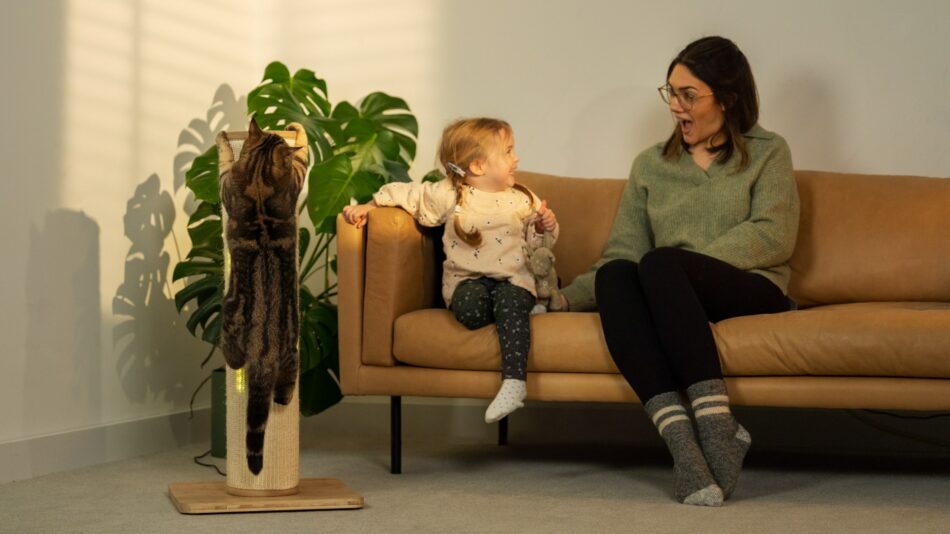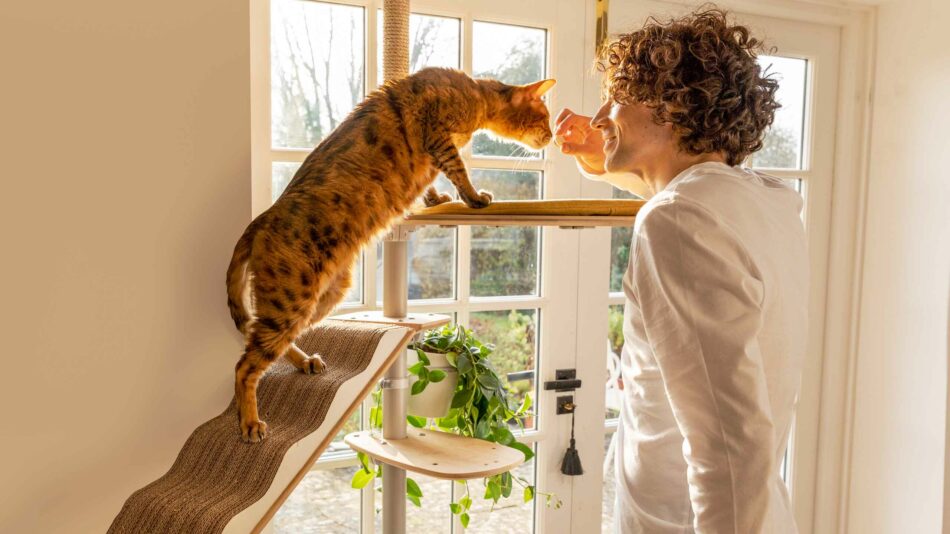Is my cat overweight? Signs of feline obesity and how to prevent
We love our felines, and ensuring their well-being is a top priority for pet owners. But have you ever picked up your furry friend and wondered, is my cat just super fluffy or is my cat overweight? Just like humans, cats can struggle with a few extra pounds, which can lead to various health issues if left unchecked. In this blog, we’ll explore the signs of feline obesity, why it’s crucial to prevent it, and what you can do to keep your furry companion fit and healthy.
How to tell your cat is overweight
Recognising whether your cat is carrying a few extra pounds can sometimes be a challenging task, especially since cats come in all shapes and sizes. However, there are some telltale signs to look out for.
Feelin’ the fur: Take a moment to give your kitty a gentle pet. Can you feel their bones under all that fluff? A healthy cat should have a bit of padding, but if it feels more like squishing a pillow, it might be time for a closer look.
The “pudgy paws” test: Check out those paws. If your cat’s once dainty digits now resemble mini marshmallows, they might be carrying a bit too much weight. Extra padding on the paw pads is a telltale sign of obesity.
Watch ’em walk: Take a gander at your cat’s strut. If they’ve got a noticeable waddle or jiggle when they move, it could be a sign of excess weight.
Belly beware: Lift your cat’s front legs and peek underneath. Can you see a muffin top where their waist should be? While it’s a good sign in baked goods, it could be an indication of excess weight on our feline friends.
Tail-end trouble: Your cat’s tail can reveal a lot about their weight. If it’s looking more like a sausage than a sleek swish, they might be carrying some extra heft.
Cuddle cautiously: Sure, snuggling up with your favourite feline is adorable, but if their belly feels like a beanbag chair, it might be time to reconsider those extra treats.
Weighing in: While every cat’s ideal weight varies, a trip to the vet’s office for a weigh-in can provide valuable insights.
Lackluster leaping: Is your once agile acrobat now more of a couch potato? If they’re opting for catnaps over zoomies, it might be due to carrying excess weight. Time to encourage some more playtime.
Why you want to avoid extra weight in cats
Extra weight in cats, just like in humans, can seriously impact their health and quality of life. Picture this: you wake up feeling sluggish, your joints creaking like an old floorboard, and every movement feels like you’re lugging around a sack of potatoes. That’s what it’s like for overweight cats, except they can’t hit the gym or switch up their diet on their own.
Carrying those extra pounds puts immense strain on their joints, leading to arthritis and aches that can make even a leisurely stroll to their cat food bowl feel like a marathon. And let’s not forget the risk of diabetes, heart disease, and other serious health issues that lurk in the shadows of those extra pounds.
But it’s not just physical health at stake here. A lack of energy and a sense of sluggishness can stop them enjoying the activities they need to keep them mentally stimulated, relaxed and happy, such as climbing, playing and scratching.
Obesity in cats can significantly impact their health and quality of life. Excess weight can also lead to respiratory problems, liver disease, and urinary tract issues. Keeping your furry friend fit and fabulous is not just for the sake of their waistlines, but for their own enjoyment and vitality, which benefits us so much.
How to prevent obesity in cats
Preventing obesity in cats ideally starts with establishing healthy habits from an early age, but can be encouraged at any life stage. Remember, moderation and movement are key to keeping our furry friends in tip-top shape. Here are 5 top ways to keep your cat in shape:
- Playtime palooza: Engage in daily play sessions that encourage your cat to jump, chase, and pounce, ensuring they get their heart rate up and those calories burning. Set aside dedicated time each day to engage in active play with your cat by using interactive cat toys and games that stimulate their natural hunting instincts. The Switch Cat Scratching Post is a playtime game changer, with over 1200 light modes for endless entertainment.
- Foodie fun: Make mealtime more interactive by using food puzzles or slow-feeders to encourage your cat to work for their meal, keeping their minds sharp and their tummies satisfied without overindulging.
- Vertical ventures: Cats love to climb, so invest in an indoor cat tree where they can perch and explore, providing both mental stimulation and opportunities for physical activity.
- Window watcher workout: Set up a cozy perch with a comfy cat bed by a window where your cat can leap up and bird-watch or simply soak up the sun. It’s like Netflix for cats—entertaining and calorie-free.
- Outdoor adventure: Take your cat on supervised outdoor adventures with a safely enclosed outdoor Catio, allowing them to explore new sights and smells while getting some fresh air and exercise.
Omlet and your cat
Ensuring your cat maintains a healthy weight is vital for their overall well-being. By being mindful of their diet, providing ample opportunities for exercise and play, and monitoring their weight regularly, you can help prevent obesity and keep your furry friend happy and healthy. At Omlet, we understand the importance of nurturing the bond between you and your pet, which is why we design products like the Freestyle Indoor Cat Tree and the Switch Cat Scratching Post to prioritize their well-being and enhance your connection with them. After all, healthy cats are happy cats and happy cats are what we love.
This entry was posted in Cats


